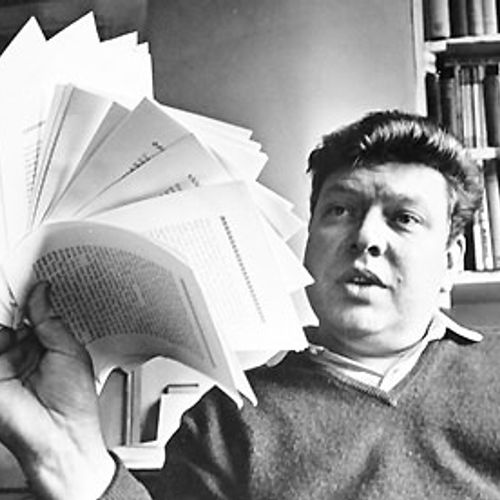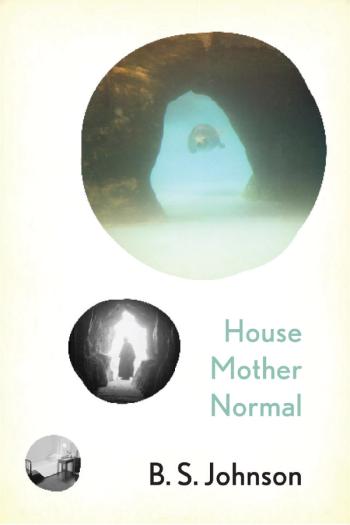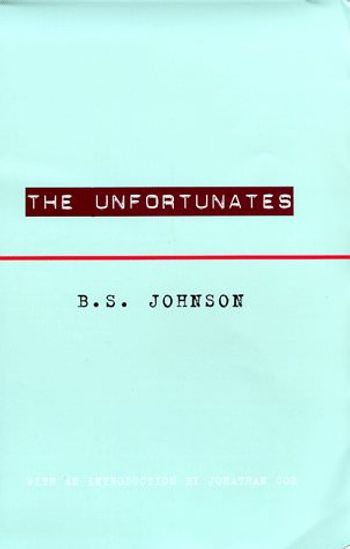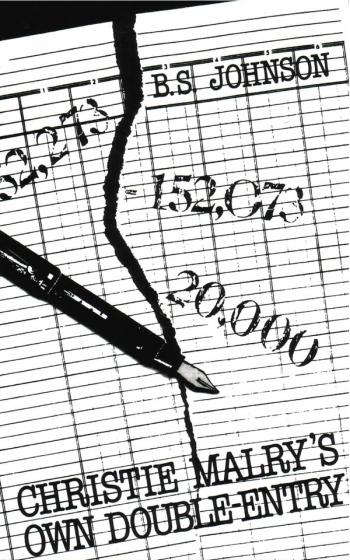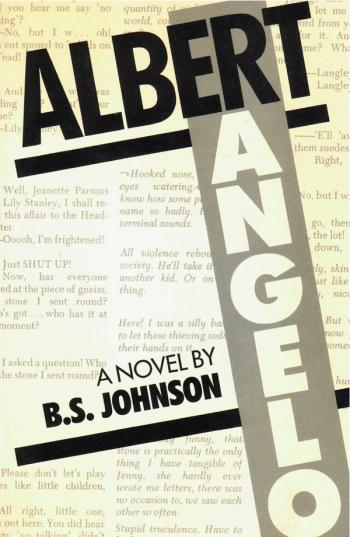B.S. Johnson
B.S. Johnson (1933–1973) was born in Hammersmith, England, and aside from World War II, during which he was an evacuee, lived in London for most of his life. His first novel, Travelling People, won the Gregory Award for 1963. In a preface to the book, he wrote, “I decided that one style for one novel was a convention I resented most strongly: it was perhaps comparable to eating a meal in which each course had been cooked in the same manner. The style of each chapter should spring naturally from its subject matter.” Thus Travelling People employs eight separate styles for its nine chapters, including a letter, journal extracts, and a film script. One chapter contains the interior monologue of an old man prone to heart attacks. First the author uses a random grey pattern to indicate sleep or recuperative unconsciousness, and then later, black, when the old man dies. (Most obvious is Johnson’s acknowledged debt to an eighteenth-century predecessor, Laurence Sterne, whose celebrated Tristam Shandy also contained black pages.)
Albert Angelo (1964) employs unusual devices to draw attention to physical descriptions which Johnson felt tended ordinarily to be missed. At one point, the thoughts of a teacher are given on the right hand side of the page in italics, while his pupils’ speech is placed on the left in roman. Albert finds a fortune teller’s card on the street, and the card is not described, but simply reproduced. When a future event is to be revealed, a rectangular hole several lines in length is simply cut through those pages intervening between the prophesy and its fulfillment, so that the event is read in place before the reader actually reaches that point, several pages later in the narrative. (Australian Customs seized Albert Angelo refusing to release the novel until they had been shown the obscenities which, they were convinced, had been excised by the rectangular hole in the text.)
“In some ways,” says Johnson, “the history of the novel in the twentieth century has seen large areas of the old territory of the novelist increasingly taken over by other media, until the only thing the novelist can with any certainty call exclusively his own is the inside of his own skull: and that is what he should be exploring.” Trawl (1966), which won the Somerset Maugham Award, is an extended interior monologue where, in order to compensate for an absence of paragraph breaks, the line length is deliberately shortened, giving the book a long narrow format. “The moment at which The Unfortunates (1969) occurred,” tells Johnson, “was on the main railway station at Nottingham. I had been sent there to report a soccer match for The Observer [where Johnson was a long-time sports reporter] … I had hardly thought about where I was going, but when I came up the stairs from the platform into the entrance hail, it hit me: I knew this city … It was the city in which a very great friend of mine had lived until his tragic early death from cancer two years before.” Throughout the afternoon, the dead past (memories of the friend) and the living present (routine soccer reporting) interact and transpose themselves in a random manner in the author’s mind, as Johnson set out to re-create as nearly as possible a transcript of how his mind worked during that day. The various sections of The Unfortunates were unbound and packed loosely in a box. The sections were of different lengths––some only a third of a page long, others as long as twelve pages. The longer ones were bound into signatures, but each section in itself arrived in the reader’s hands in random order and could be read in any order he liked, thus reflecting the randomness of the material: a tangible metaphor for the randomness and the nature of cancer.
Along with novel writing and sports reporting, B.S. Johnson was the author of two volumes of poetry; one of short stories; Aren’t You Rather Young to Be Writing Your Memoir, a collection of nonfiction; the text for a series of photographs; a play, B S Johnson v. God, produced in 1971. He was poetry editor for Transatlantic Review and a Fellow at the University of Wales. Johnson was also a television and film director; his You’re Human Like The Rest Of Them won the Grand Prix at Tours and Melbourne in 1968. At the time of his suicide in 1973, he was at work on a trilogy, the full title of which was to be read across the spine of the three books: See The Old Lady Decently/Buried Although/Amongst Those Left Are You. Only one volume was actually completed.
